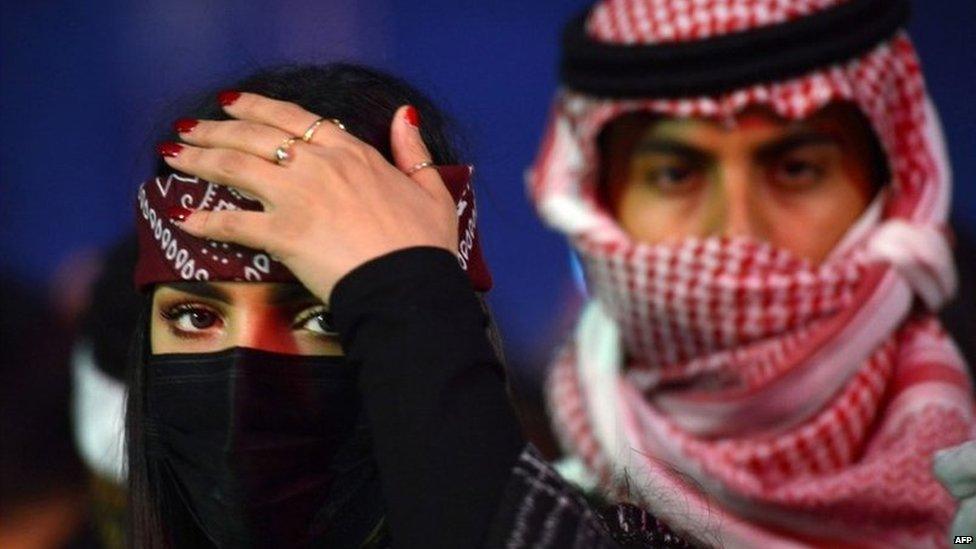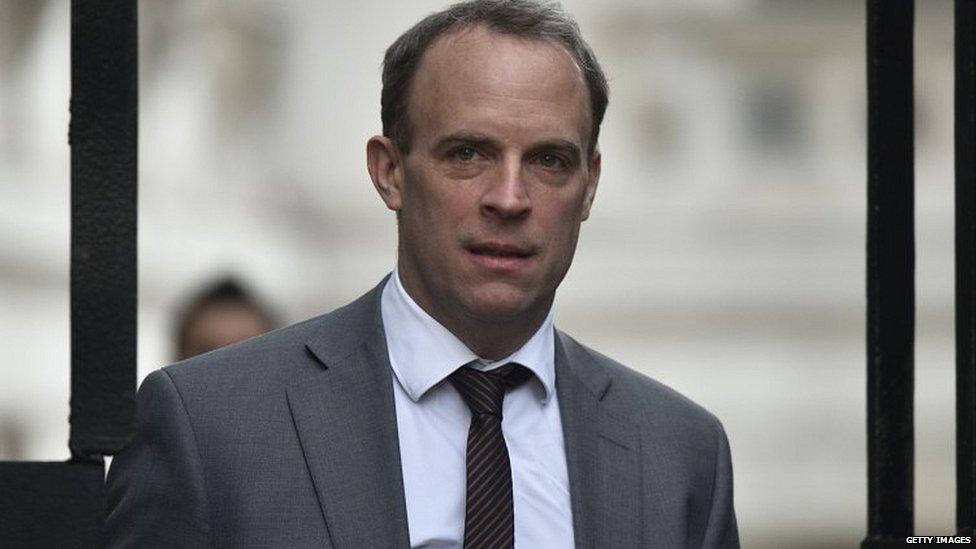Saudi Arabia: Raab to press 'valued partner' on human rights
- Published

Social and cultural reforms in Saudi Arabia have been accompanied by a crackdown on dissent, campaigners say
Dominic Raab is to press the Saudi Arabian government on its human rights record during his first visit to the country as foreign secretary.
The Foreign Office said Mr Raab would "engage" with Saudi counterparts on the issue and other areas of "difference".
He will also discuss the "devastating" humanitarian situation in Yemen and efforts to end its long-running war.
Labour has urged ministers to end all arms sales to Saudi Arabia, a major protagonist in the Yemeni conflict.
Last summer, the UK promised to stop approving export licences for arms to Saudi Arabia which could potentially be used in the civil war following a legal challenge by campaigners.
The UK and other Western powers are providing logistical support to a Saudi-led multinational coalition which is supporting the Yemeni government in its fight against the Iranian-backed rebel Houthi movement.
The five-year conflict, seen as part of a regional power struggle between Shia-ruled Iran and Sunni-ruled Saudi Arabia, has devastated the country and, according to the UN, claimed the lives of at least 7,500 civilians.
Ahead of his two-day visit to Saudi Arabia, Mr Raab stressed its long-standing economic, security and intelligence ties with the UK but also the need for close co-operation on regional and global challenges.

Mr Raab will stress the close ties between the countries but also the need for co-operation on shared challenges
The foreign secretary will hold talks with his Saudi counterpart, Prince Faisal bin Farhan, and the government's National Security Adviser Dr Musaad Al Aiyban as well as the Yemeni President Abdrabbuh Mansour Hadi.
Officials said Mr Raab would continue to "drive progress" on the Yemen peace process, following the recent surge in Houthi violence and constraints on getting humanitarian aid to those in need.
Four-fifths of the Yemeni population - 24 million people - are in need of humanitarian assistance or protection, including ten million who rely on food aid to survive.
'Valued partner'
The Foreign Office said Mr Raab would also raise issues "where we have differences, including on human rights and values".
Human rights groups have accused Saudi Arabia's ruling royal family of condoning the torture of political opponents as part of a sustained crackdown on dissent in the past couple of years - something the regime has rejected.
In November 2018, Amnesty International and Human Rights Watch alleged that scores of human rights activists, intellectuals and clerics had been unlawfully detained and several of them, including women, had been either flogged, electrocuted or sexually harassed.
Saudi Arabia also continues to face international pressure over the unresolved murder of journalist Jamal Khashoggi in the Saudi consulate in Istanbul in October 2018.
It has blamed the killing on rogue agents but denied claims that Crown Prince Mohammed bin Salman had knowledge of the operation. However, the CIA reportedly believes Mohammed bin Salman ordered the murder.
Mr Raab, who visited Oman and Turkey earlier this week, said Saudi Arabia was one of the UK's "closest trade partners and plays an important role in keeping Britain safe".
He added: "As a valued partner, we have to work closely together to tackle the crisis in Yemen, terrorism and climate change as well as pursuing reform and engaging on human rights issues."
Labour leader Jeremy Corbyn has called for the UK to suspend all military aid to Saudi Arabia, amid claims that the Saudi-led coalition has been responsible for the indiscriminate killing of civilians in Yemen.
Under UK export policy, military equipment licences should not be granted if there is a "clear risk" that weapons might be used in a "serious violation of international humanitarian law".
The Court of Appeal ruled last summer that existing sales should be reviewed, although not suspended, following a challenge by the Campaign Against the Arms Trade.
Ministers subsequently gave assurances that no further export licences would be issued while the government considered the ruling although, in September, International Trade Secretary Liz Truss, was forced to apologise for two breaches of the pledge.